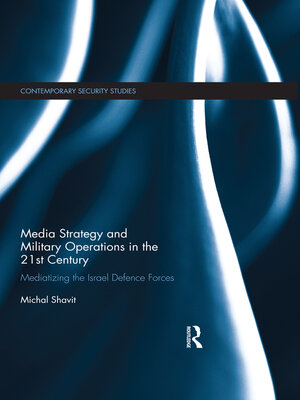Media Strategy and Military Operations in the 21st Century
ebook ∣ Mediatizing the Israel Defence Forces · Contemporary Security Studies
By Michal Shavit

Sign up to save your library
With an OverDrive account, you can save your favorite libraries for at-a-glance information about availability. Find out more about OverDrive accounts.
Find this title in Libby, the library reading app by OverDrive.



Search for a digital library with this title
Title found at these libraries:
| Library Name | Distance |
|---|---|
| Loading... |
This book applies the concept of mediatization to the contemporary dynamic between war, media and society, with a focus on the Israel Defence Forces (IDF).
Since the beginning of the 21st century the IDF has undergone an intensive process of mediatization that has transformed the media into an interpretative grid for many of its military activities and increasingly utilized media to garner public support and construct civilian perceptions of conflict and security through media activity and strategy. This process can be divided into four distinct chronological phases in accordance with the operational challenges confronted by the IDF during this period, from the Al-Aqsa Intifada of 2000, through Israeli unilateral disengagement from Gaza in 2005, and the second Lebanon war of 2006, to the series of Gaza confrontations of 2008-2014. The work shows how the IDF's media policy evolved from a narrow perception of its role, and separation between operational and media actions to a cohesive and coherently articulated media strategy that is increasingly intertwined with military action and operational strategy and a vital component of strategic military aims and objectives. This strategic stance has led the IDF to adopt a global media perspective using the most advanced new media platforms, designed to influence public opinion and improve national narratives, both in Israel and the international community. By applying the concept of mediatization to the Israeli case, this book fills a research lacuna and offers a new prism for the study of media-military relations in contemporary conflicts.
The book will be of much interest to students of civil-military relations, strategic studies, Middle Eastern Studies, media and communication studies, sociology and IR, in general.







